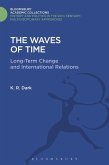Why did the nation-state emerge and proliferate across the globe? How is this process related to the wars fought in the modern era? Analyzing datasets that cover the entire world over long stretches of time, Andreas Wimmer focuses on changing configurations of power and legitimacy to answer these questions. The nationalist ideal of self-rule gradually diffused over the world and delegitimized empire after empire. Nationalists created nation-states wherever the power configuration favored them, often at the end of prolonged wars of secession. The elites of many of these new states were institutionally too weak for nation-building and favored their own ethnic communities. Ethnic rebels challenged such exclusionary power structures in violation of the principles of self-rule, and neighboring governments sometimes intervened into these struggles over the state. Waves of War demonstrates why nation-state formation and ethnic politics are crucial to understand the civil and international wars of the past 200 years.
Dieser Download kann aus rechtlichen Gründen nur mit Rechnungsadresse in A, B, BG, CY, CZ, D, DK, EW, E, FIN, F, GR, HR, H, IRL, I, LT, L, LR, M, NL, PL, P, R, S, SLO, SK ausgeliefert werden.
'For all their usefulness, quantitative studies of conflict often suffer from theoretical shallowness and historical myopia. Andreas Wimmer complements his quantitative study of global conflict with a deep theoretical understanding of nationalism and ethnicity. He then embeds it into a powerful historical account of the rise and spread of the nation-state during the past two centuries. Waves of War is a critical and timely contribution to the study of conflict that sets a new standard.' Stathis N. Kalyvas, Yale University








![Migration Waves in Eastern Europe [1990-2015] (eBook, PDF) Migration Waves in Eastern Europe [1990-2015] (eBook, PDF)](https://bilder.buecher.de/produkte/50/50831/50831942m.jpg)
